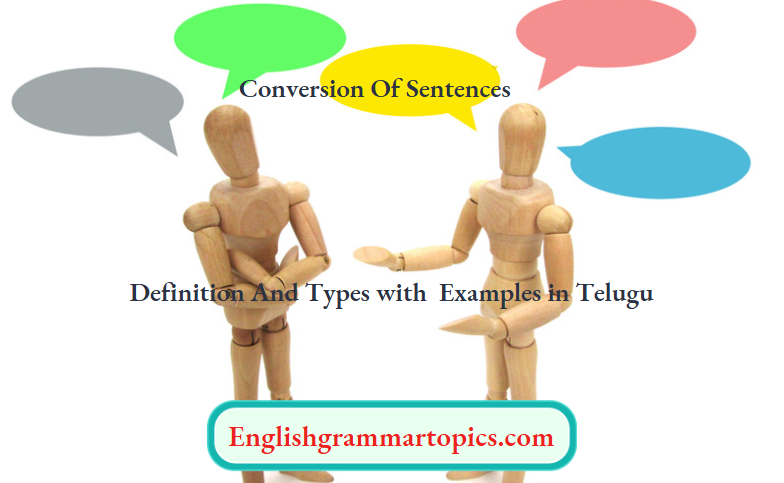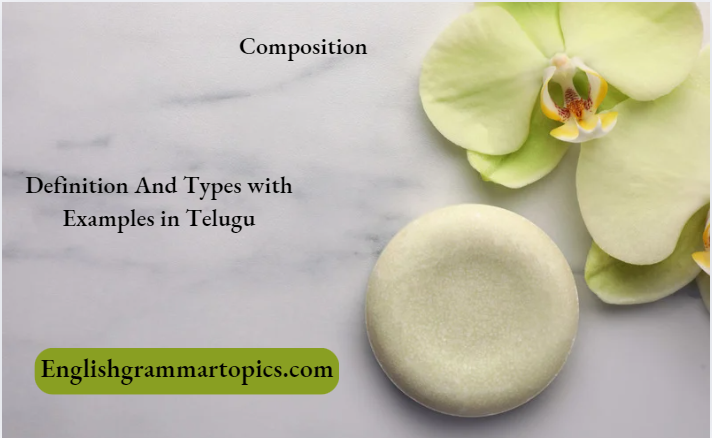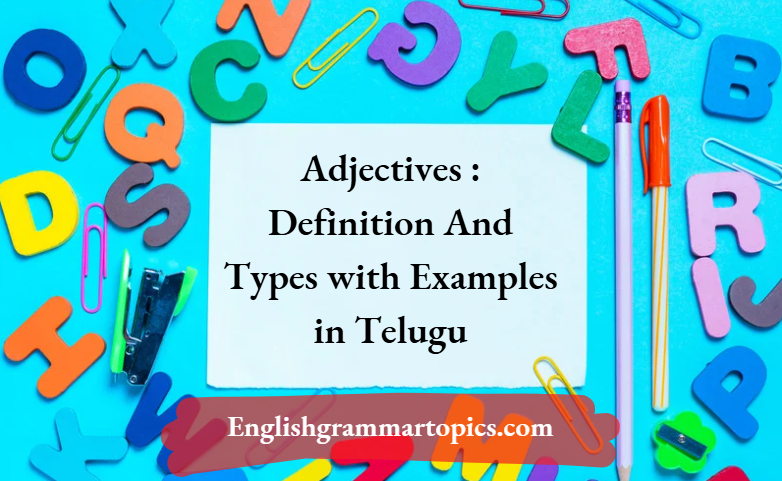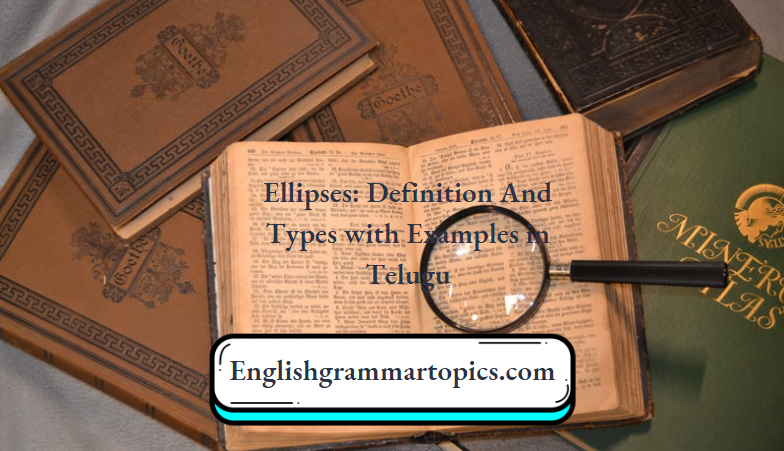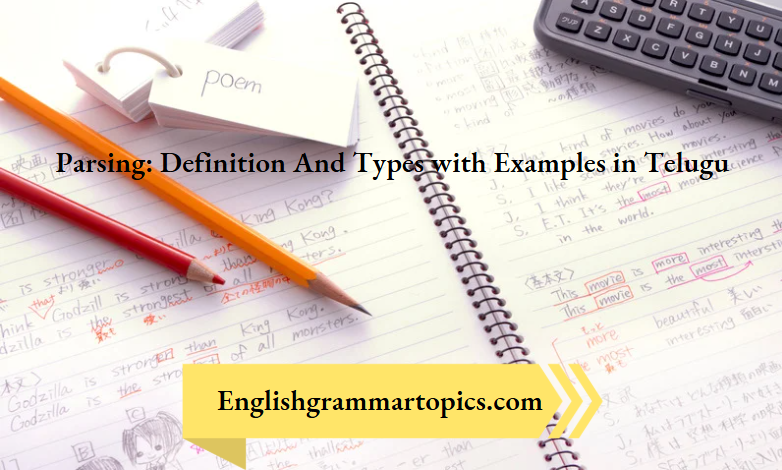Prepositions
To prepositions, the language owes much of its flexibility, so that a person’s command of English may be judged by the way in which he use the prepositions and “They are the spice’ as John O’ London remarks.
1. ఒక Noun కు Pronoun కు గాని ముందుంచబడి, అవి తెలియచేయు వస్తువులకును ఇతర వస్తువులకును గల సంబంధము తెలుపు మాటలు Prepo- sitions అనబడును.
Ex: The book is on the table.
ఒక Preposition కు తరువాత వచ్చు noun గాని pronoun గాని ఎప్పుడును Objective case లో నుండును. అప్పుడది ఆ Preposition చేత govern చేయబడునని గాని లేక ఆ preposition కి Object అని గాని చెప్పుదురు.
2. రెండు గాని, అంతకంటే ఎక్కువ మాటలుగాని చేరి ఒక Preposi tion యొక్క పనిని నెరవేర్చున యెడల అవి Phrase-Preposition or Prepositional Phrase ad. On account of, instead of in spite of, with respect to.
Swift says “I write Gulliver’s Travels with a view to informing and instructing mankind but withut my view to profit or praise”.
3. verbs, nouns, adjectives and participles o కొన్ని ప్రత్యేకమైన prepositions విధాయకముగా వచ్చును. వాటిని Appropriate Prepositions అందురు.
da: (a) listen to, depend upon; (b) affection for; limit to; (c) fond of, affectionate to, (d) astonished at, born to. Intransitive verbs a Preposition 530 Transitive verbs అగును. అప్పుడు ఆ Prepositions ను విడిగా phrase చేయకూడదు. He laughed at me. I looked at the sky.
4. Use of phrases: (a) in view of (b) with a view to (c) with the view of the above three phrases are each equivalent to a preposition and each is liable to be confused in meaning or in form with the others.
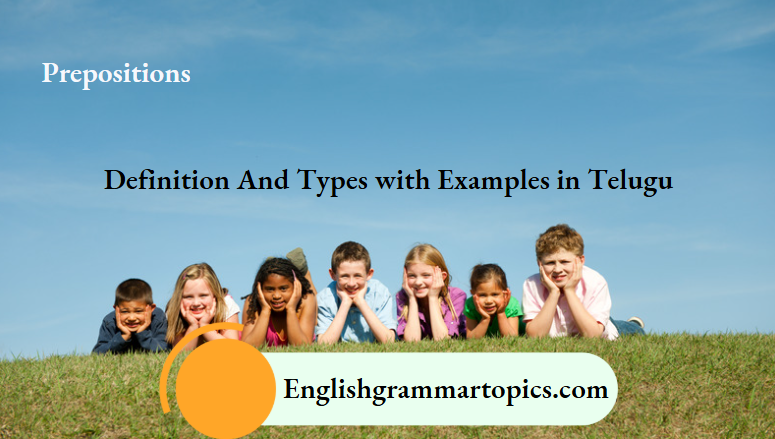
Read and Learn more English Grammar Topics
| Phrase | Meaning | Use | Example |
| (a) In view of view=sight | Taking into account [ex- ternal circumstances that exist now in the present] | + noun | In view of the state of the ground, the match will not be played to-day. |
| (b) (1) with a view to (2) without any view to (view eye) | Calculating upon [a desired re- sult in future] | + noun gerund | (a) With a view to [the increase t of increasing agricultural out-put special powers are granted to the D.P.W. (b) Swift says: I write Gulliver’s Travels with a view to informing and instructing man- kind, but without any view to profit or praise. |
| (c) With the view of (view-purpose) | intending to do(in future) a thing in one’s competence. | +gerund | with the view of building a house he has bought land. |
When the verb cannot be used as noun [or has no noun fom] there is only one use of the phrase government issued gold bonds on liberal terms. (b) i.e. with the gerund of the verb; e.g.-With a view to overcoming foreign exchange difficulty, the
Note: (1) The variant of the phrase (b), with the infinitive (with a view to increase) is not only vulgar and unidiomatic but ungrmmatical in as much as the phrase, being equivalent to a preposition, should not be followed by the verb form (to increase).
Prepositions denoting (a) Point of time and
(b) Period of time.
(1) Study the following sentences :
(1) You must be back by four ‘O’ clock.
(2) I have been ill since yesterday.
(3) He will take the medicine from the first of January.
(4) 1 shall return before Friday next.
(5) The school has been closed since May.
(6) His health has been bad since 1950.పై వాక్యములలో Four o’ clock, yesterday, First of January, Friday next, May, 1950 అనునవి ఒక పని ఎప్పటి నుండి ప్రారంభించునో లేక ఎప్పటిలోపున ముగించునో నిర్ణయించుచున్నవి. కాబట్టి ఇట్టి మాటలు Point of time ను తెలియజేయును.
(2) Study the following sentences:
(1) I shall be back in an hour.
(2) Istayed there for a day.
(3) I shall finish the work within four days.
(4) I have been here for the last one month.
(5) I have been studying English for two years.
(6) 1 have not heard from you for a long time.
పై వాక్యములలో An hour, A day, Four days, One month, Two years, A long time అనునవి ఒక పని యెంతకాలము జరిగినది లేక జరుగుచున్నదో, అనగా ఆ పనియొక్క అవధిని లేక పరిమాణము (Duration of action) ను సూచించుచున్నవి. కాబట్టి ఇట్టి మాటలు Period of time ను తెలియజేయును.
Note : 1. Point of time ను తెలియజేయు మాటల ముందు ఉపయోగింపబడిన Prepositions ఏవి? By, since, from, before, ఈ Prepositions ను point of time ముందేకాని period of time ముందుపయోగింప
కూడదు.
Note : 2. Period of time ను తెలియజేయు మాటల ముందు వుపయోగింపబడిన Prepositions ఏవి? In, within, for, కాబట్టి ఈ Prepositions Period of time wods Point of time
ముందుపయోగింపకూడదు.
Special uses of Prepositions
1. In-at : పెద్ద స్థలముల విషయములలో In, చిన్న స్థలముల విషయములలో at ఉపయోగింపబడును.
ఉదా : (1) He lives in Calcutta. (2) He is now in England. (3) The party stopped at an inn. (4) He was born at a small village in Mysore. (5) The English won the battle fought at Plassey in Bengal.
At, point of time ను సూచించును. in, period of time ను సూచించును.
ఉదా: He will start at sixo’ clock in the evening. He will start in a month.
2. In, within : ఈ రెండు కూడ, period of time ముందుపయోగింపబడును. In an hour అనగా ఒక గంట అగుపరికి within an Thour అనగా ఒక గంట లోపుగా.
hour).
ఉదా: You must return in an hour at the end of an hour) You must return within an hour (before the end of an
Note: This work must be done within four o’clock తప్పు; ఏలన four o’ clock అనునది point of time కాబట్టి This work must be done by (or before) four o’ clock అనవలెను.
3. After, in : ఈ రెండును కూడ period of time ను సూచించును. కాని period of time భూతకాలమునకు చెందునపుడు after వాడవలెను. భవిష్యత్కాలమునకు చెందునపుడు in వాడవలెను.
ఉదా: He started work after a few days. He will start the work in a few days.
N.B.: After భవిష్యత్కాలము విషయములో ఉపయోగింపబడకూడదు. ఉదా : He will start the work after a few days అనుట తప్పు.
4. From, since ఇవి రెండును కూడ point of time సూచించును. అర్థభేదము కూడ లేదు, కాని ప్రయోగమునందు మాత్రము భేదము కలదు.
Since ఉపయోగించునపుడు verb Present perfect tense లో గాని, Present perfect continuous tense లో గాని వుండవలెను. కాని from ఉన్న వాక్యములో verb ఏ tense లో నైనను ఉండవచ్చును.
| Since | From | ||
| Present | I have been | I shall attend | future |
| Perfect | ill since | school from | |
| or | yesterday | to-morrow. | |
| Present | I have been | I attend school | present |
| Perfect | suffering from | from to-day | |
| Continuous | pain since | I attend school | past |
| Monday | from Wednesday to Sunday |
Note 1. ‘I have been ill from yesterday’ y ‘I have been lame from my childhood అనవచ్చును.”
Note 2. ‘I have been unwell since three weeks’ e తప్పు; ఏలన, “Three weeks’ అనునది period of time కాబట్టి ‘I have been unwell for three weeks’ అనవలెను.
V. For, before: 536 for, period of time; before point of time మ సూచించును.
From a verb, past tence verb చే సూచింపబడు పని యొక్క ఆది, అంతములు చెప్పవలెను. of time ను సూచించును.
| For | Before |
| 1. I have lived in Calcutta for ten years. | Rama will rise before six o’ clock. |
| 2. I lived in Calcutta for ten years. | Govind will not rise before five o’clock. |
Note 1. ‘I am suffering from pain from four dayss is a very common mistake; it should be: I have been suffering from pain for four day
Note:2. Theschoolwillnotoperyora week’s Theschool willnotopen in (or within) a week’ అనుట తప్పు; ఏలన? అట్టి negativesentence లో for మాత్రమే ఉపయోగింపవలయును.
VI. By, with : కర్త (ఒక పనిని చేయువాడు) విషయములో oy యును, ఒకపని చేయుట కుపయోగపడు సాధనము (instrument) విషయములో.. with ను ఉపయోగింపనగును.
A: The boar was slain by him with a dagger.
Ex. 35 I.
Insert correct Prepositions in the places left blank:-
1. The field was ploughed up.. ….a peasant….a pair of oxen. 2. The work must be done…. twelve O’clock. 3. You must be back…. a week. 4. No one has seen him…. Wednes- day last. 5. He cannot get home…. sunset. 6. I shall be ready to start….two or three days. 7. Take care to be back midday. 3. I shall not be back…. the end of the week. 9. He has been absent from home…. Friday last, and I do not think he will return…. the 30th of next month. 10. Let me see you again… ..an hour’s time. 11. I have been having fever…. ten days. 12. I shall have completed my task…. to-morrow evening. 13. The train will start…. forty minutes from now. 14. I have lived. …Allahabad…. Ist March. 15. i was born…. Rome-Italy. 16. The city motor service will not be opened…. a year. 17. He succeeded in his attempt…. four years. 18. I received the message….eight O’clock…. the morning. 19. I saw him felling a tree…. an axe. 20. The portrait was painted….a famous artist who lived…. the seventeenth century. 21. He will start his business…. to-morrow. 22. You must finish your work…. three O’clock this evening. 23. My friend cannot get up….7 O’clock.
Ans: 1. by; with 2. by 3. in 4. since 5. before 10. in 11. for 12. by 13. in 15. at; in 16. for 17. after 21. from 22. before (or by).
Ex. 35 J
Correct the following by correcting the prepositions :-
1. I have not seen him since three days. 2. I was born at New York. 3. Rama must be here within noon. 4. I shall be ready to go after two hours. 5. You will not see me again before a month. 6. I have had nothing to eat long since. 7. He has been absent from last Tuesday. 8. I shall have finished this business within to-morrow evening. 9. I have lived at Rome since a year. 10. Govind has been absent since four months and will come back after a fortnight. 11. The train will not start before ten minutes. 12. Come to my house after an hour. 13. I have been a clerk in this office since five years. 14. You have not visited me long since. 15. He was kicked with his horse. 16. He spent four months at Bengal. 17. He lives at London. 18. I have not seen him from a long time. 19. I have cut it by a knife. 20. Is Ceylon in the south or west of India? 21. I send you this letter with Govind.
Ans: 1. for 2. in 3. by or before 4. in 5. for 6. for two days 7. since 8. by 9. for 10. for; in 11. in 16. in 19. with 20. to 21. per.
Appropriate Prepositions
Absent from school.
(Be) Accompanied by a person; with a thing.
Accuse a person of a crime.
(Be) Accustomed to riding.
Adjacent to a field.
Affection for a person or a thing.
Affectionate to a person or children.
Afraid of death, punishment or animal.
Agree to a proposal; with a person; on conditions; among themselves.
Aim at a thing.
(Be) Alarmed at the sight.
Alight from a horse or a carriage on the ground, at the gate.
Amount to a hundred (come to)
Angry with a person; at a thing.
Apologise to a person(beg-pardon)
Appeal to a person or one’s feelings for redress or help.
Apply to a person, for a thing; to a thing. (e.g. the remark
applies to the present case; Apply for leave).
Arrive at a place or conclusion; in a country.
Ask a person for a thing; a thing of a person.
(Be) Ashamed of misconduct.
(Be) Astonished at the news or conduct.
Attacked by a person, with disease.
Attend to one’s work (do): to a teacher (listento): on or upon. masters or sick persons (wait on or be ready to serve).
N.B.:- Attend school, meeting, or office; church or lectures, etc. Attentive to a teacher.
Avenge (oneself) on a person (wreak vengeance).
N.B.: Avenge an insult or wrong (inflict retribution. e.g. Soorpanaka tried to avenge the wrong done to her by Rama). Bark at a thief.
Bear a grudge against a person for somthing. Beg (a thing) of person (a person) for a thing. Believe in
(1) God, ghosts (have faith in the existence of)
(2) One’s honesty (have faith in)
(3) Oil engines (have faith in the efficacy of)
(4) Pampering servants (have faith in the advisability of)
N.B. Believe a man (i.e. what he says)
Belong to a person.
(Be) Bent on doing a thing = Intent on doing a thing.
Bestow (a thing) upon a person (confer).
Beware of thieves, dogs, mistakes, dangers. etc.
(Be) Blind of one eye;to one’s own faults, or to consequences (not to see or notice).
Boast of learning, riches, strength (be proud of).
Born to sorrows; with a silver spoon in mouth: under a lucky star.
Bound for a place (going to, intending to go to e.g. The ship was bound for London).
Call at a person’s house (go there). The occasion calls for quick action: for explanation.
Call forth all (one’s) energy.
Call on or upon a person (visit him at his house).
Call upon a person (require him to do something).
Call to a person (shout to)
Care for a person or thing (attach value to)
Carry on business (continue out an order, proposal, plan
(execute it); off (remove)
Caution against danger.
Charge a person with a crime.
Cheat a man of his money. Clear off debt (discharge).
Come about (take place).
Come across anyone (meet accidentally), a word, a passage, a
thing (meet with)
Come by a thing (obtain)
Come of a respectable family.
(Be) Born of something. (result from)
Compare a thing to another (to show likeness); a thing with,
another (to show contrast).
Compete with a (person) for (a thing).
Complain of a person or thing; about a person or thing; to a person against or of another.
Comply with one’s request or wishes.
(Be) Composed of materials of which a thing is made.
(Be) concerned with a thing (have to do with), about a thing (feel uneasy or anxious); in an affair (had anything to do with).
Concur with a person.
Confident of success. Confined to bed, thing,
Congratulate a person on his success.
Consent to a thing; proposal
Consist of its parts; in (e.g. Greatness consists in pardoning one’s foe).
Consult with a person (to think together).
N.B.- Consult a person (seek his advice).
(Be) Content with one’s lot.
Correspond with a person (write letters); to something (agree with or be similar to).
Cure a person of a disease or a bad habit.
Deal with a person, subject (treat) with a person (have transac- tions with him).
Deal in rice, sugar (trade in)
Decide on or upon a plan.
Delighted with the offer; in doing good to others.
To (be) delivered of a child to (give birth to); deliver a (letter, a percel).
Depend on or upon one’s help.
Deprive a person of a thing.
Desirous of gain; desire for wealth
Despair of success.
Die of a disease, from other things (hunger, wound); by violence, the sword; in battle; for one’s country; in poverty (die a beggar)
Differ from or with a person (e.g. A person differs from or with another in opinion or on a subject. A thing differs from another (be unlike).
Difference between two things.
Distinguish one thing from another, between two things.
Divide a thing between two; among many.
Due to one’s negligence (owing to)
Duty to parents.
Endow (a school, a public hospital) with, (Be)-endowed with genius by nature.
Entrust a person with a thing; a thing to a person.
Envious of another’s success or prosperity or beauty.
Envy (n) at another’s success.
N.B. Women envy superior beauty.
Fail in an attempt.
Fail in love with a person.
Familiar with (A person is familiar with a thing); to (a thing is familiar to a person).
Feed on grass or other food;
a baby with milk, or a cow with grass.
Feel for a person in trouble (have pity for).
Fond of a fruit; reading novels, a person or thing.
Free from errors; cares; of charges interest.
Free a person from restraint.
Glad of one’s promotion, at the result.
Grateful to a person.
Greedy of gain; after riches.
Grieve at or for an event, a person.
Guard against, or from danger.
Happen to a person.
Ignorant of a fact.
Inform a person of a thing.
Inquire or Enquire into a matter; of a person;
about a matter; after a person.
Insist upon payment.
Intimate (adj.) with a person (familiar)
Intimate (verb) a fact to a person.
Judge of a person by his actions.
Lame of leg; in the right or left leg.
Lament for the dead.
Laugh at a person; for his folly.
Leave for a place (go to).
Listen to a person (hear attentively, obey) to what one says.
Live upon rice, vegetables (subsist): by begging or other means.
Look at a person, or thing.
Look after a person, thing or business (take care of).
Look for something lost (search).
Look to a thing or business.
Made of wood, clay, gold.
Meddle with a person or a person’s affairs or a thing (as a watch).
Mock at a person.
Mourn for a person that is dead.
Moved at the sight; to tears with pity; by entreaties or threats.
Need (n) for a thing; assistance; of caution.
(In) Need of help.
Necessary to happiness or success.
Necessity for his going.
Obedient to parents or teachers.
Object to a proposal.
(Be) Obliged to a person; for a favour.
Occur to one’s mind (strike or suggest itself).
Occur to a person (happen) part with money or a thing (give);
from a person (depart).
Partake of food.
Partial (adj.) to a friend.
Play at cricket; on the fiddle.
Prevent a person from coming or doing something.
N.B.:- Prevent a thing (e.g.) Rain prevented the match.
Prefer one thing to another.
Present a person with a thing.
Pride oneself upon something.
Prohibit a person from doing something.
Proud of a person, position, learning.
Provide for one’s children, oneself or family, against a coming evil or danger.
Provide a person with a thing; a thing for a person (furnish). N.B.:- Crops provide food.
Put up with one (stay with one); at a place (large); with a thing (endure).
Quarrel with a person; over a thing.
Recovr from illness.
Recover the price, etc. from a person.
Refer to a book or records.
Refer a matter to a person.
Relieve a person from pain or distress.
N.B. Relieve pain or poverty (lessen). Relieve a sentry (release from duty).
Rely on or upon a person or thing (depend on).
Remind a person of a thing (put him in mind of).
Repent of one’s past bad conduct.
N.B. Repent one’s hastiness or foolishness.
Reply to a letter or person.
Revenge oneself on a person for some injury.
Rid a place of dacoits (to get rid of); a troublesome thing.
Rob a person of a thing.
Rule over a country.
Search for or after something.
(In) Search of a thing (food etc.)
Seek for an employment or happiness; after honour, wealth etc.
Send for a person, a doctor (=require to be brought).
Shoot at a thing (bird, mark or animal)
Side with a person (go over to his side).
Sorry for the loss.
Stare at a person
Succeed to the throne; in an attempt.
Supply a person with a thing; a thing to a person.
Sure of success.
(Be) Surprised at a strange thing or news.
Sympathise with a person; another’s sorrow. Sympathy for the poor.
Thankful to a person for a favour.
Trust in a person; to a thing (man’s honesty).
Turn to a person for help.
Vexed at a thing, with a person.
Wait upon a person (attend as a servant); for a person (stay).
Want of money (absence of money).
Wanting in courage (lacking).
Warn a person of danger; against a fault.
Watch for an opportunity.
Wonder at a thing, news.
Worthy of praise.
Yield to an enemy (submit).
Ex. 36
1. Fill up the blanks with Prepositions :-
(a) 1. He is very kind…. me. 2. I write….a slate… . a pencil. 3. The tank is full…. water. 4. We cannot cross it. … foot. 5. The slate is…. the box. 6. He went…. his house. 7. Can you look…. the moon? 8. He sold his dog…. ten rupees. 9. He fell…. the river. 10. Wait…. the gate. 11. He is angry …. me. 12. Divide this…. six men. 13. Divide this…. A and B. 14. It is not fit…. use. 15. I am waiting…. my friend. 16. He died…. hunger. 17. The table is made…. wood. 18. The wall is built….stone. 19. Do not depend…. the help….others. 20. Do not depend….others….help. 21. He laughed…. me. 22. He was absent….school yesterday. 23. What are you afraid
.? 24. The boy is absent….leave. 25. The boy is….leave now. 26. I have been ill…. four days. 27. I have been ill…. yesterday. 28. He is accused…. theft. 29. He is charged…. theft. 30. The man is now…. danger. 31. He goes…. door. … door. 32. Give me a chair to sit….. 33. I have a ball to play ….. 34. I am going….a walk. 35. I am pleased…. you… your honesty. 36. He went…. Calcutta…. Madras. 37. He fell…. the horse.
Ans:- 4. on 11. with 12. among 13. between 16. of 19. upon; of 22. from 24. without 25. on 28. or 29. with 30. out of 31. from; to 32. on 35. with; about.
(b) 1. Do you agree proposal. 3. He was angry me? 2. They did not agree — my what you did. 4. You boast — your learning. 5. I beg–you this favour. 6. He did not comply — myrequest. 7. I quite sympathise you. 8. I feel no sympathy— him. 9. He was moved —pity. 10. He was moved — tears. 11. The king fell-love—the princess. 12. He is blind — one eye. 13. He is blind — his own faults. 14. You are fond —play. 15. He is-search-food. 16. I am not aware — this 17. She is delivered — a male child. 18. I supplied him–good rice. 19. He is intent his studies. 20. I prefer walking — running. 21. The crops failed- -want- rain. 22. He entrusted the work -me. 23. He entrusted me — provided food — him. 25. I provided him–
— the work. 24. 1 food. 26. On his way home he called my house. 27. You may call — me in the evening. 28. God has endowed man— reason. 29. The passage is free errors. 30. I informed you the fact. 31. Brahmins live-rice and vegetables. 32. He reminded me–my promise. 33. He put me — mind my promise. 34. I insisted— his going. 35. a Ford, he has an ambassador car. 36. Do not cry — spilt milk. 37. He died his country. 38. The business was set foot. 39. He set the house-fire. 40. I am astonished — – the news. 41. The lake abounds — fish. 42. He is proficient – –mathematics. 43. He proved false— his friend. 44. She gave birth a male child. 45. The teacher punished the boy his mischief. 46. He set out walk. 47. Oh God! keep me —: 48. I am grateful you the help you rendered me. 49. The boys are clamouring – a holiday. 50. It is 9 O’clock watch.
Ans: 1. with 2. to 3. at 4. of 5. of 6. with 7. with 8. for 9. with 10. to 11. in ….with 12. of 13. to 15. in of 16. of 17. of 18. with 19. on 20 to 21. for… of 22. to 23. with 24. for 25. with 26. at 27. on 28. with 29. from 30. of 31. on 32. of 33. in…of 34. on 35. besides 36. over 38. on 41. in 45. for 47. from 49. for 50. by.
2. Correct the following:-
1. He is angry upon me.
2. You are very kind on me.
3. Be polite on him.
4. I depend your help.
5. He does not listen my advice.
6. Look the book on the table.
7. I am pleased for him.
8. He attends upon his lessons.
9. I am suffering by pain.
10. He has been ill from four days.
11. She is afraid by a dog.
12. Chairs are made with wood.
13. I must listen what you say.
14. All along I travelled on road.
15. He attends to school regularly.
16. The proposal was agreed by them.
17. He was surprised by the news.
18. He ordered to me to finish the work soon.
19. People travel on sea.
20. Such behaviour is not worthy to you.
21. We are accustomed with these inconveniences.
22. He at once applied to the post.
23. He cheated me five rupees.
24. He robbed my property.
25. My request was not complied to.
26. These things are quite familiar with me.
27.. This cloth is different to that.
28. He ordered for ten books.
Ans: 1. angry with 2. to 3. to 4. depend upon 5. listen. to 6. look at 7. pleased with 8. attends to 9. suffering from 10. for 11. afraid of 12. made of 13. travelled by 15. attends school 16. agreed to by them 17. surprised at 18. ordered me 20. worthy of 21. are accustomed to 22. applied for 23. cheated me of 24. robbed me of my property 25. complied with 26. to 27. different from 29. ordered ten books.
Note the following Exceptions:-
That e Relative Pronoun, & Preposi- tion చేత govern చేయబడినపుడు ఆ Preposition వాక్యమునకు చివర రావలెను. కాని that నకు ముందు రాకూడదు. ఉదా : The house in that I live అనకూడదు. The house that I live in అవవలెను. That ఉన్న వాక్యములో Preposition ను చివరకు తీసికొని రావలెను. అట్లు తీసుకొనివచ్చినపుడు, that ను లోపింపజేయవచ్చును. ఉదా :- “The house I live in.’ The man that you spoke of becomes “The man you
spoke of.
or that
2. Whom, which or that 355 Preposition 3 govern చేయబడినపుడు Preposition వానికి ముందు గాని, వాక్యమునకు చివరగాని 3. 1. This is the house in which I live. 2. That is the man whom we were looking for. 3. Which of the chairs did you sit on? 4. What is this the result of?


